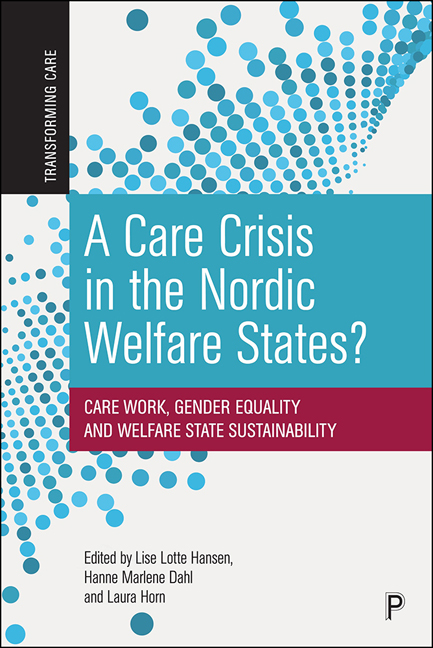 A Care Crisis in the Nordic Welfare States?
A Care Crisis in the Nordic Welfare States? Book contents
- Frontmatter
- Contents
- List of tables
- Notes on contributors
- Preface
- 1 Introduction: A care crisis in the Nordic welfare states?
- 2 The ‘care crisis’: its scientific framing and silences
- 3 Fraser’s care crisis theory meets the Nordic welfare societies
- 4 Crisis of care: a problem of economisation, of technologisation or of politics of care?
- 5 Deteriorating working conditions in elder care: an invisible crisis of care?
- 6 Managerialism as a failing response to the care crisis
- 7 ‘We are here for you’: the care crisis and the (un)learning of good nursing
- 8 Professionalisation of social pedagogues under managerial control: caring for children in a time of care crisis
- 9 Raising quality in Norwegian early childhood centres: (re)producing the care crisis?
- 10 Conclusion: Less caring and less gender-equal Nordic states
- 11 Postscript: A care crisis in the time of COVID-19
- Index
8 - Professionalisation of social pedagogues under managerial control: caring for children in a time of care crisis
Published online by Cambridge University Press: 13 May 2022
- Frontmatter
- Contents
- List of tables
- Notes on contributors
- Preface
- 1 Introduction: A care crisis in the Nordic welfare states?
- 2 The ‘care crisis’: its scientific framing and silences
- 3 Fraser’s care crisis theory meets the Nordic welfare societies
- 4 Crisis of care: a problem of economisation, of technologisation or of politics of care?
- 5 Deteriorating working conditions in elder care: an invisible crisis of care?
- 6 Managerialism as a failing response to the care crisis
- 7 ‘We are here for you’: the care crisis and the (un)learning of good nursing
- 8 Professionalisation of social pedagogues under managerial control: caring for children in a time of care crisis
- 9 Raising quality in Norwegian early childhood centres: (re)producing the care crisis?
- 10 Conclusion: Less caring and less gender-equal Nordic states
- 11 Postscript: A care crisis in the time of COVID-19
- Index
Summary
Introduction
The field of early childhood education and care (ECEC) is characterised by great diversity in status and organisation in different countries. Care for children is commonly heavily dependent on unpaid and non-formal care work by mothers and relatives, or poorly paid nursing and childminding, for instance by migrant workers (Acker, 1990; Bäck-Wiklund, 2004). Consequently, a common strategy for the valorisation of care work pursued by feminist policy-makers and researchers, in the Nordic countries in particular, is that of professionalisation or ‘professional projects’ (Witz, 1990; Williams, 1996; Dahl, 2010). In Denmark, this political strategy has been advocated not only by the labour unions of the (social, educational and health) care workers and by their educational institutions. The possibilities and advantages of professionalisation have also been taken up and promoted as part of policy discourses and regulatory reforms around the ‘modernisation’ of public services as a means to enhance the quality of care, and the legitimacy of public service and reproduction on a broader scale (Wrede et al, 2008; Dahl, 2010). Seen from this point of view, professionalisation is not a controversial strategy.
Taking a closer look at the underlying interests and explicit reasons for professionalisation, there is however less consensus among the advocating agents. In fact, discussions of professionalisation expose controversies not only about the aims, but also the means of professionalisation. Following Witz (1990), this chapter argues that the potential of professionalisation as a strategy rests on the validation of the substance of the professional practice at its core: on the one side, the basic understandings and recognition of the services rendered; on the other side, the status of professional knowledge, qualifications and necessary judgements, values and ethics needed to act with professionalism to secure the quality of the tasks and services provided. This chapter explores the potentials of professionalisation strategies, motivated by the central question of whether professionalisation will actually help in providing recognition for essential ECEC care work – and whether this can counteract a ‘crisis of care’, as discussed in the contributions to this book.
The following discussion will raise concerns about the status of care work and the potential of professionalisation based on empirical research in the context of care work in Danish ECECs. The term ECECs is used to denote the common public institutions in the field of ECEC.
- Type
- Chapter
- Information
- A Care Crisis in the Nordic Welfare States?Care Work, Gender Equality and Welfare State Sustainability, pp. 139 - 157Publisher: Bristol University PressPrint publication year: 2021


